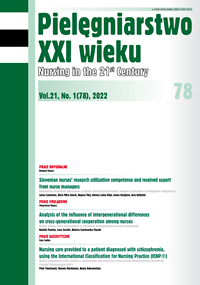Slovenian nurses’ research utilization competence and received suport from nurse managers
DOI:
https://doi.org/10.2478/pielxxiw-2022-0002Keywords:
competence, evidence-based practice, nursing, research utilization, supportAbstract
SLOVENIAN NURSES’ RESEARCH UTILIZATION COMPETENCE AND RECEIVED SUPORT FROM NURSE MANAGERS
Introduction. Research utilization is the core of evidence-based practice. Nurse managers have an important role to support competence management and research utilization in nursing care.
Aim. The aim of the study was to investigate the research utilization competence of Slovenian nurses working in hospitals and the received support from nurse managers related to research utilization. Research utilization competence comprises attitudes and the knowledge and skills.
Methods. A descriptive, cross-sectional study design was used. The participants were nurses (n=154) from eight hospitals in Slovenia. Data was collected using the Competence in Research Utilization instrument and analyzed statistically.
Results. Nurses’ attitudes were positive. Nurses’ appreciation of research utilization was higher than their readiness to commit themselves to research utilization. Nurses’ knowledge related to acquisition research evidence and reading and appraising research was rather limited even if they assessed their skills as above moderate. The received support from nurse managers related moderately to nurses’ research utilization skills.
Conclusions. The research utilization competence of nurses is recommended to be strengthened with systematic competence management and support from nurse managers in clinical practice. Nurse managers can support nurses’ research utilization competence by encouraging them to participate in continuing education and by building systematic academic cooperation and networking between educators, researchers, and nurse clinicians.
References
1. Melnyk B, Gallagher-Ford L, Zellefrow C, et al. The First U.S. Study on nurses’ evidence-based practice competencies indicates major deficits that threaten healthcare quality, safety, and patient outcomes. Worldviews Evid Based Nurs. 2018; 15: 16-25. doi: 10.1111/wvn.1226910.1111/wvn.1226929278664
2. Bianchi M, Bagnasco A, Bressan V, et al. A review of the role of nurse leadership in promoting and sustaining evidence-based practice. J Nurs Manag. 2018; 26: 918-932. doi:10.1111/jonm.1263810.1111/jonm.1263830198088
3. Skela-Savič B, Gotlib J, Panczyk M, et al. Teaching evidence-based practice (EBP) in nursing curricula in six European countries – A descriptive study. Nurse Educ Today. 2020; 94: 04561. doi.org/10.1016/j.nedt.2020.10456110.1016/j.nedt.2020.10456132905986
4. Skela-Savič B, Hvalič-Touzery S, Pesjak K. Professional values and competencies as explanatory factors for the use of evidence-based practice in nursing. J Adv Nurs. 2017; 73: 1910-1923. doi: 10.1111/jan.1328010.1111/jan.1328028205259
5. Belita E, Squires JE, Yost J, et al. Measures of evidence-informed decision-making competence attributes: a psychometric systematic review. BMC Nurs. 2020; 19: 44. doi.org/10.1186/s12912-020-00436-810.1186/s12912-020-00436-8725476232514242
6. Strandberg E, Eldh AC, Forsman H, et al. The concept of research utilization as understood by Swedish nurses: Demarcations of instrumental, conceptual, and persuasive research utilization. Worldviews Evid Based Nurs. 2014; 11: 55-64. doi.org/10.1111/wvn.1201310.1111/wvn.1201323879321
7. Florczak KL. Evidence-based practice: What’s new is old. Nurs Sci Q. 2016; 29: 108-112.doi.org/10.1177/089431841663009610.1177/089431841663009626980886
8. Heikkilä A. Ammattikorkeakoulusta valmistuvien hoitotyön opiskelijoiden tutkitun tiedon käyttö [Research knowledge utilisation of polytechnic nursing students on graduation]. [Doctoral dissertation]. University of Turku, Finland; 2005. [in Finnish language]
9. Heikkilä A, Hupli M, Katajisto J, Leino-Kilpi H. Yliopistosairaaloiden hoitotyöntekijöiden tutkimustiedon käytön osaaminen. [Research utilization competence of nurses´ working in university hospitals]. Tutkiva Hoitotyö. 2019; 17: 31-40. [in Finnish language]
10. Li S, Jeffs L, Barwick M, Stevens B. Organizational contextual features that influence the implementation of evidence-based practices across healthcare settings: A systematic integrative review. Syst Rev. 2018; 7 (72): 1-19. doi.org/10.1186/s1364 3 018 0734 510.1186/s13643-018-0734-5593662629729669
11. Speroni KG, McLaughlin MK, Friesen MA. Use of evidence-based practice models and research findings in magnet designated hospitals across the United States: National survey results. Worldviews Evid Based Nurs. 2020; 17: 98-107. doi: 10.1111/wvn.1242810.1111/wvn.1242832246749
12. Farahnak LR, Ehrhart MG, Torres EM, Aarons GA. The influence of transformational leadership and leader attitudes on subordinate attitudes and implementation success. JLOS. 2020; 27: 98-111. doi.org/10.1177/154805181882452910.1177/1548051818824529
13. Melnyk BM, Zellefrow C, Tan A, Hsieh AP. Differences between magnet and non-magnet-designated hospitals in nurses’ evidence-based practice knowledge, competencies, mentoring, and culture. Worldviews Evid Based Nurs. 2020; 17: 337-347. doi: 10.1111/wvn.1246710.1111/wvn.1246733022875
14. Powell BJ, Waltz TJ, Chinman MJ, et al. A refined compilation of implementation strategies: results from the expert Recommendations for Implementing Change (ERIC) project. Implement Sci. 2015; 10: 21. doi: 10.1186/s13012-015-0209-10.1186/s13012-015-0209-1
15. Bole U, Skela-Savič B. Odnos in znanje medicinskih sester ter ovire pri implementaciji na dokazih temelječe prakse: integrativni pregled literature. [Knowledge, attitudes and barriers in the implementation of evidenced-based practice among nurses: an integrative literature review]. Obzornik zdravstvene nege. 2018; 52 (3): 177-185. [in Slovenian language]10.14528/snr.2018.52.2.206
16. Gallagher-Ford L, Koshy Thomas B, Connor L, et al. The effects of an intensive evidence-based practice educational and skills building program on EBP competency and attributes. Worldviews Evid Based Nurs. 2020; 17: 71-81. doi:10.1111/wvn.1239710.1111/wvn.1239732017438
17. Galiano A, Simonetti M, Quiroga N, Larrain A. Development, implementation and evaluation of an evidence-based practice model in a new hospital in Chile. J Nurs Manag. 2020; 28: 1748-1757. doi:10.1111/jonm.1313410.1111/jonm.1313432799398
18. Caramanica LJ, Spiva L. Exploring Nurse Manager Support of Evidence-Based Practice: Clinical Nurse Perceptions. J Nurs Adm. 2018; 48: 272-278. doi:10.1097/NNA.000000000000061210.1097/NNA.000000000000061229629909
19. Heikkilä A, Hupli M, Katajisto J, Leino-Kilpi H. Finnish graduating nursing students´ research utilization competence. J Nurs Educ Pract. 2018; 8: 119-127. doi.org/10.5430/jnep.v8n8p11910.5430/jnep.v8n8p119
20. Heikkilä A, Kaučič BM, Filej B, et al. Slovenian nursing students’ competence in research utilization, and the support they received during clinical practice. Cent Eur J Nurs. Midwifery. 2021; 12 (2): 376-384. doi:10.15452/CEJNM.2021.12.0013.10.15452/cejnm.2021.12.0013
21. Erjavec K, Starc J. Competencies of nurse managers in Slovenia: A qualitative and quantitative study. Cent Eur J Nurs Midwifery. 2017; 8: 632-640. doi:10.15452/CEJNM.2017.08.001210.15452/CEJNM.2017.08.0012
22. Suhonen R, Ylönen M, Jalonen L, Holopainen A. Leading evidence-based practice in Finnish healthcare. [In:] Hafsteinsdóttir TB, Jónsdóttir H, Kirkevold M, Leino-Kilpi H, Lomborg K, Rahm Hallberg I. (eds.) Leadership in nursing: Experiences from the European Nordic Countries. Springer Nature Switzerland AG; 2019. pp. 83-98.10.1007/978-3-030-10964-6_7
Downloads
Published
Issue
Section
License
Copyright (c) 2022 Authors

This work is licensed under a Creative Commons Attribution 4.0 International License.




